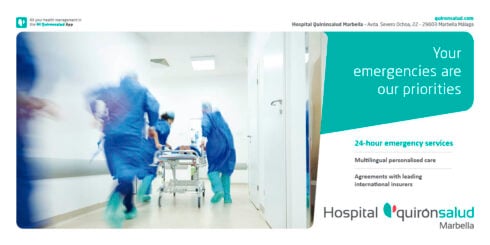WITH summer in full swing and temperatures across Spain soaring, thousands of families will take a dip in pools, rivers and the sea in order to escape the sweltering heat.
It is our young kids, more than anyone, who love the feeling of splashing away in the great outdoors for hours upon hours.
But all this fun can come with a price.
Dr Luis Alberto Sierra Guerra, a specialist in the Paediatrics at Hospital Quirónsalud Marbella, explains that increased bathing activities, sweating and higher temperatures can develop infections in the urogenital area.
“This is the case of cystitis, which is the name given to inflammation of the secondary urinary bladder”, he says.
Although the infection is different in most people, Dr Luis points out there are several key warning signs to look out for.
“Cystitis is characterised by a sudden and uncontrollable urge to urinate, even when the bladder is still filling.
“In addition, there can be a burning sensation during urination, which can often occur more frequently.
“Occasionally there can be suprapubic pain in the lower abdomen, or even blood in the urine”, he explains.
Paediatricians such as Dr Luis are well-versed in dealing with urinary tract infections, which are common in boys under six months of age and girls over a year old.
He stresses that the best way to determine the effective diagnosis for your child is a physical examination and analysis of the urine.
He says: “This is the definitive test as it provides information on what is affecting the patient and therefore the ideal remedy to eradicate it”.
Given that most cases of cystitis are caused by bacteria, antibiotics are often prescribed, but Dr Luis stresses the most important thing is to identify the cause of the infection to avoid the risk of recurrence.
“If the cause is not identified and the symptoms are treated, the symptoms may improve, but then an episode of cystitis will likely recur”, he says.
Tips to prevent cystitis
As part of a message to raise awareness with parents and families, the Paediatrics Service at Hospital Quirónsalud Marbella has provided a series of recommendations on how to reduce the risk of cystitis.
These are:
- Keeping your kids hydrated
- Educating children about healthy urinating behaviour: for example, teaching them not to hold urine in, to urinate every 3 to 4 hours, to avoid wetting underwear, and to clean the urogenital area well (for both boys and girls)
- Proper control of bowel habits to avoid constipation
- Not wearing clothes that are wet or too tight for a prolonged period of time
- Ensuring kids dry themselves after getting out of the water and avoid wearing wet swimming costumes
- Avoiding exposure to the sun when sweating excessively as this exacerbates dehydration
- Not self-medicating – the use of antibiotics without medical advice increases the risk of microorganisms developing antibiotic resistances.
- Always consulting your paediatrician if you have any worries
Quirónsalud in Andalucia
The Quirónsalud Hospital Group currently has seven hospitals in Andalusia located in the cities of Malaga, Marbella, Los Barrios (Cadiz), two in Sevilla, Cordoba and Huelva, as well as 18 specialised and diagnostic medical centres and a surgical day hospital, which position it as the leading private hospital group in this autonomous community.
About Quirónsalud
Quirónsalud is the leading healthcare group in Spain and, together with its parent company Fresenius-Helios, also in Europe. In addition to its activity in Spain, Quirónsalud is also present in Latin America. Together, it has more than 50,000 professionals in more than 180 healthcare centres, including 57 hospitals with more than 8,000 hospital beds. It has the most advanced technology and a large team of highly specialised professionals with international prestige. Among its centres are the Fundación Jimenez Díaz University Hospital, Teknon Medical Center, Ruber Internacional, Quirónsalud Madrid University Hospital, Quirónsalud Barcelona Hospital, Dexeus University Hospital, Policlínica Gipuzkoa, General de Catalunya University Hospital, Quirónsalud Sagrado Corazón Hospital, etc.
The Group works to promote teaching (ten of its hospitals are university hospitals) and medical-scientific research (it has the FJD Health Research Institute, accredited by the Secretary of State for Research, Development and Innovation).
Likewise, its care service is organised into units and cross-cutting networks that allow optimising the accumulated experience in the different centres and the clinical translation of their research. Currently, Quirónsalud is developing a multitude of research projects throughout Spain and many of its centres carry out pioneering work in this field, being pioneers in different specialties such as oncology, cardiology, endocrinology, gynaecology and neurology, among others.
For more information, please visit www.quironsalud.com/marbella or call
+34 952 774 200
Click here to read more Other News from The Olive Press.








